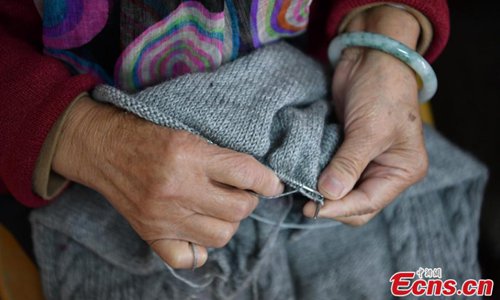
A total of 19 knitters, whose average age is 75, have worked tirelessly in the past nine months, knitting 184 warm sweaters in their spare time for needy children in a village in Qiaojia county of the province. (Photo: China News Service/ Liu Ranyang)
New COVID-19 cases in Dalang town in South China's Guangdong Province have sparked concerns over the production of sweaters there, as Dalang is the largest wool knitting yarn trading center in China.
"Friends are joking that the prices of sweaters might go up," a resident of Dongguan told the Global Times on Tuesday.
But industry practitioners said the impact is still limited as the peak season has passed.
Dalang is known as the "global woolen textile center," as it is one of the wool knitting industry clusters with the most complete industry chains in China.
The town, with an area of less than 100 square kilometers, has nearly 10,000 wool textile enterprises.
A manager from Yongzhong Clothes Co surnamed Fan said that since the peak season has passed, the impact is limited, but part of the logistics system has been affected.
"With some parts of Dalang listed as medium-risk areas, some samples and auxiliary materials cannot be transported to the assembly plants, which has had a certain impact on production," Fan told the Global Times.
He noted that most factories in Dalang are still working, though raw materials of certain colors may be out of stock.
Dalang's annual output of sweaters is about 800 million pieces, accounting for 18 percent of China's total.
If clusters in surrounding areas are included, the annual output of sweaters could reach 1.2 billion. Industry data show that 60 percent of the output is exported to more than 80 countries and regions. Fan said employees are waiting to take a break in January, as the busiest months are September and October.
"This year, domestic orders have grown 10 percent from 2020, boosted by e-commerce sales. Foreign trade, however, has been hit hard with the rising cost of international freight," Fan said.
A total of 21 confirmed COVID-19 cases were reported in Dongguan from December 13 to Monday, all from Dalang town, officials said on Tuesday.
The Dongguan government has announced eight supportive policies to help Dalang-based enterprises, especially small and medium-sized enterprises (SMEs), tackle difficulties during viris prevention and control.
For instance, water rates for industrial, commercial and individual businesses in Dalang will be reduced by 30 percent. For accommodation and catering units, the garbage disposal fee will be halved. Supplies of electricity, gas, water and communication networks for production and living in the area will be guaranteed, and supplies won't be suspended even if payments are overdue.
The Dongguan city government also said at the press conference that the supply chain will be guaranteed as needed to support enterprises, and to help SMEs and individual businesses restore production.
Dongguan has promptly started the deployment of epidemic prevention supplies, and has allocated 2 million disposable medical masks to Dalang town, as well as disposable medical protective suits, sample tubes and temperature track tools.



